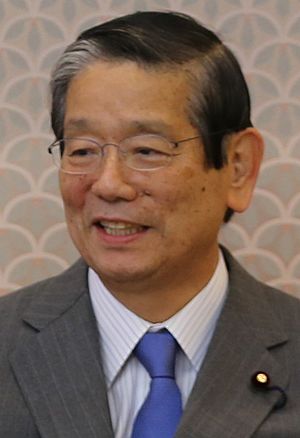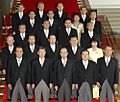Nobutaka Machimura facts for kids
Quick facts for kids
Junior Second Rank
Nobutaka Machimura
|
|
|---|---|
|
町村 信孝
|
|
 |
|
| Speaker of the House of Representatives | |
| In office 24 December 2014 – 21 April 2015 |
|
| Monarch | Akihito |
| Preceded by | Bunmei Ibuki |
| Succeeded by | Tadamori Oshima |
| Chief Cabinet Secretary | |
| In office 26 September 2007 – 24 September 2008 |
|
| Prime Minister | Yasuo Fukuda |
| Preceded by | Kaoru Yosano |
| Succeeded by | Takeo Kawamura |
| Minister for Foreign Affairs | |
| In office 27 August 2007 – 26 September 2007 |
|
| Prime Minister | Shinzō Abe |
| Preceded by | Tarō Asō |
| Succeeded by | Masahiko Kōmura |
| In office 27 September 2004 – 21 September 2005 |
|
| Prime Minister | Junichiro Koizumi |
| Preceded by | Yoriko Kawaguchi |
| Succeeded by | Tarō Asō |
| Personal details | |
| Born | 17 October 1944 Numazu, Japan |
| Died | 1 June 2015 (aged 70) Tokyo, Japan |
| Political party | Liberal Democratic Party (1983–2015) |
| Alma mater | University of Tokyo Wesleyan University |
Nobutaka Machimura (町村 信孝, Machimura Nobutaka, 17 October 1944 – 1 June 2015) was an important Japanese politician. He was a member of the House of Representatives of Japan, which is like one of the main parts of Japan's parliament. He belonged to the Liberal Democratic Party, a major political group.
Machimura held several big jobs in the Japanese government. He was the Chief Cabinet Secretary for Prime Minister Yasuo Fukuda from 2007 to 2008. This role is like a top advisor and coordinator for the government. He also served twice as the Minister for Foreign Affairs, which means he was in charge of Japan's relationships with other countries. He held this role under Prime Ministers Junichiro Koizumi and Shinzō Abe. He later became the Speaker of the House of Representatives but had to step down in 2015 due to health issues.
Contents
Early Life and Education
Nobutaka Machimura was born on October 17, 1944. He studied at two well-known universities. First, he attended the University of Tokyo in Japan. Later, he continued his education at Wesleyan University in the United States.
Political Career Highlights
Machimura began his political journey in December 1983. He was elected to the House of Representatives for the first time. After that, he was re-elected in every election that followed, showing he was a popular politician.
Key Government Roles
Machimura held many important positions in the Japanese government:
- Minister of Education, Science, Sports and Culture: He first took on this role in September 1997. He was in charge of schools, science, sports, and culture. He held this position again later.
- State Secretary for Foreign Affairs: In July 1998, he worked on Japan's foreign relations.
- Special Advisor to the Prime Minister: He advised Prime Ministers Keizō Obuchi and Yoshirō Mori starting in March 2000.
- Minister of Education, Culture, Sports, Science and Technology: From January 2001, he led these important areas.
Serving as Foreign Minister
Machimura was the Minister for Foreign Affairs twice. This role is very important for how Japan interacts with the rest of the world.
- First Term (2004-2005): Under Prime Minister Junichiro Koizumi, he worked on several goals. These included trying to sign a treaty with Russia and improving relationships with China and Korea. He also focused on finding out what happened to Japanese citizens who were kidnapped by North Korean agents in the 1970s and 1980s.
- Second Term (2007): Prime Minister Shinzō Abe appointed him to this role again in August 2007.
Chief Cabinet Secretary
In September 2007, when Yasuo Fukuda became Prime Minister, Machimura was chosen as the Chief Cabinet Secretary. This is a very powerful position. The Chief Cabinet Secretary acts as the government's main spokesperson and helps coordinate all the different ministries. He also worked on issues related to the kidnapped Japanese citizens. He served in this role until September 2008.
Leadership in Politics
Machimura was also a leader within his political party, the Liberal Democratic Party (LDP). In 2006, he became the chairman of the Seiwa Seisaku Kenkyūkai. This was the largest group, or "faction," within the LDP. He helped lead this group alongside other important politicians.
Personal Life and Interests
Nobutaka Machimura had some interesting views. In December 2007, he publicly stated that he believed in the existence of UFOs (Unidentified Flying Objects).
Sadly, Nobutaka Machimura passed away on June 1, 2015. He died in a hospital in Tokyo after suffering from a cerebral infarction, which is a type of stroke.
Honours
- Junior Second Rank (awarded after his death on June 1, 2015)
Images for kids
-
Nobutaka Machimura and Condoleezza Rice in September 2007
See also
 In Spanish: Nobutaka Machimura para niños
In Spanish: Nobutaka Machimura para niños



